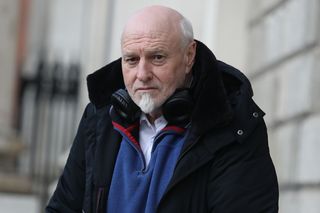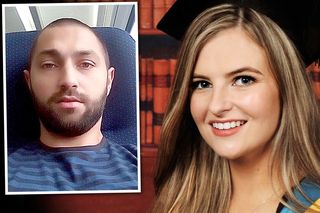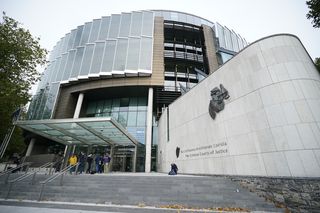Obituary: Billy Graham
American evangelist who spread the word of God to millions of people across the world for over 50 years
Billy Graham ‘probably preached to more people than any other individual in history’. Photo: AP
Billy Graham, the American evangelist who died last Wednesday aged 99, probably preached to more people than any other individual in history. Over the course of nearly 60 years he called upon more than 210m in live audiences and countless millions more through television and radio to "accept Jesus Christ as your personal saviour".
Raised in the American Presbyterian revivalist tradition that placed utmost importance on the single act of standing up and "coming forward" to be saved, Graham took his evangelical mission to more than 185 countries and territories.
"In Heaven at this moment there is a great sign that says 'Welcome'," he told his audiences. "A sign on the Cross and an empty tomb. Welcome if you will return to God. Whatever religious background you have, whatever your ethnic background, whatever your language. Whatever. You get up and come."
But Graham was much more than simply a gifted preacher, he was an astute salesman and he owed his success, and that of the evangelical organisation he founded in 1950, to attention to detail, meticulous preparation and the unashamed use of the latest advertising techniques.
In the early years of his ministry he spoke with such volume and rapidity that journalists referred to him as "God's machine gun"; in later years his style became more homespun and conversational.
The gestures, though, remained the same - the clenched fist, the pointing finger, the slashing arms, the fists thumping down on to the Bible in fury as he declared that his words should be heeded not because they were his, but because "the Bible says".
Tall, good looking and square-jawed, with flowing, light-brown hair, piercing blue eyes and a warm smile, Graham had a magnetically powerful stage presence. He was transparently warm, honest and sincere.
Unlike many other American evangelists, there were never any rumours of immorality; no one ever suggested that he was in it for the money or that he was pretending a faith that he did not hold sincerely himself. It was, indeed, his trusting simplicity that made him so effective as a preacher and put his critics at a disadvantage.
When American presidents (particularly of a Republican persuasion) needed to pray, it was Graham they called. He ministered to Eisenhower, spent the night with the Bushes before the Gulf War, and was offered an ambassadorship in Israel by Nixon.
Only Harry S Truman failed to fall for the Graham charm. In his eyes, Graham was little more than a "counterfeit" and "a publicity seeker".
William Franklin Graham was born, the eldest of four children, on November 7, 1918, in Charlotte, North Carolina. His parents were descendants of Scottish Presbyterian pioneers who believed in hard work, clean living, the Bible and the birch. On the day that prohibition was repealed in 1933, his father made Billy and his sister drink beer until they were sick.
His conversion took place in September 1934 when, as a teenage schoolboy and aspiring baseball player, he went to hear the famous fire-and-brimstone preacher Mordecai Ham, who was conducting a series of revivalist meetings in the area. When the preacher pointed in Billy's direction and said: "You're a sinner!" Billy's destiny was sealed.
The summer after leaving high school, Graham worked as a door-to-door brush salesman and discovered a talent for promotion. By the end of the summer he had sold more brushes than any other salesman in the Carolinas.
Graham enrolled in Bob Jones College (now Bob Jones University in Greenville, South Carolina), but was not happy there. Never very academic, his classwork was a shambles and he could not keep up with the course. Convinced by now that his future lay in spreading the word of God, Graham enrolled instead at the Florida Bible Institute (now Trinity College in Florida).
Ordained in 1939 by a church in the Southern Baptist Convention, in 1940 Graham won a scholarship to Wheaton College in Illinois. There he met Ruth Bell, the daughter of Presbyterian missionaries to China, who herself wanted to evangelise in Tibet.
Graham soon persuaded her that God wanted them to marry. They did so in 1943.
In 1946 he and a group of colleagues paid a visit to Britain, speaking at more than 360 meetings with extended campaigns in Manchester, Belfast, Birmingham and London.
In 1949, Graham undertook a mission to Los Angeles; scheduled for three weeks, the mission was extended to more than eight weeks, with overflow crowds filling a tent erected in the centre of town each night. His success brought him to the attention of the newspaper magnate William Randolph Hearst.
In one sermon Graham had proclaimed: "When God gets ready to shake America, he might not take the PhD and the DD. God may choose a country boy. God may choose a little nobody to shake America for Jesus Christ in this day." The speech so impressed Hearst that he fired off a memo to his editors instructing them to "Puff Graham". Graham was catapulted to national fame.
His international standing was given a boost with a highly successful 12-week mission to Britain in 1954. An open-air meeting in Trafalgar Square drew 12,000, the biggest crowd since VE Day.
More than 40,000 children gathered at the dog track in Harringay to hear Roy Rogers and Dale Evans (with Trigger, the "Gospel Horse") entertain and give their testimony.
A rally in Hyde Park attracted another 40,000 and despite the pouring rain two closing rallies, at White City Stadium and Wembley, drew 185,000, the largest crowds for a religious event in British history.
The Billy Graham Evangelistic Association became the most powerful religious media organisation in the world, backing up Graham's personal mission with a media barrage. It made radio and television programmes which were syndicated to hundreds of stations around the world.
A newspaper column, My Answer, was carried by newspapers across America with a combined circulation of more than five million readers.
During the 1990s Graham contracted Parkinson's Disease. In 2000 he announced that he was stepping down from the ministry and as leader of his evangelical association.
His wife died in 2007. They had three daughters and two sons. His eldest son, Franklin Graham, is chief executive officer of the Billy Graham Evangelistic Association.
Join the Irish Independent WhatsApp channel
Stay up to date with all the latest news














